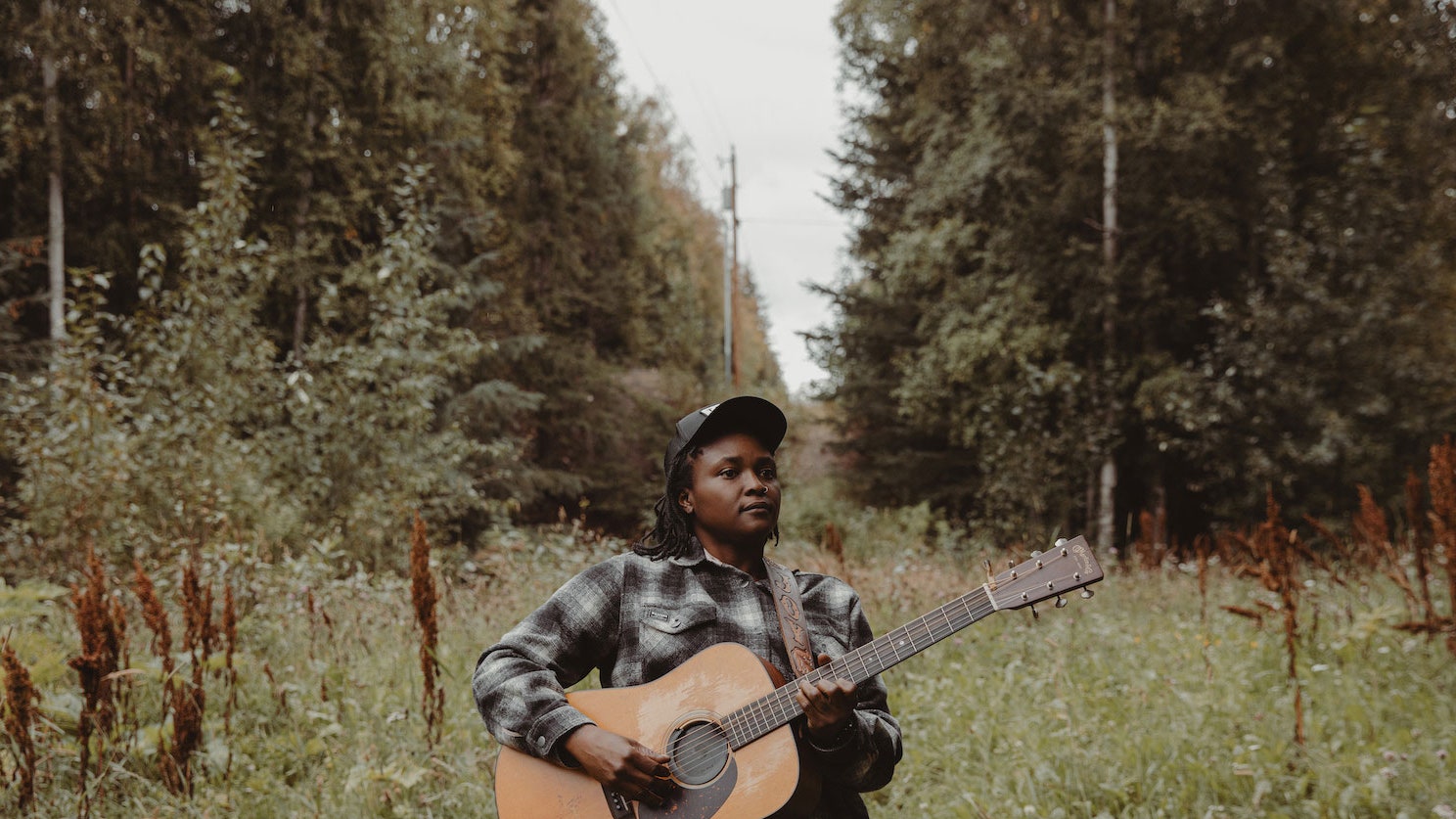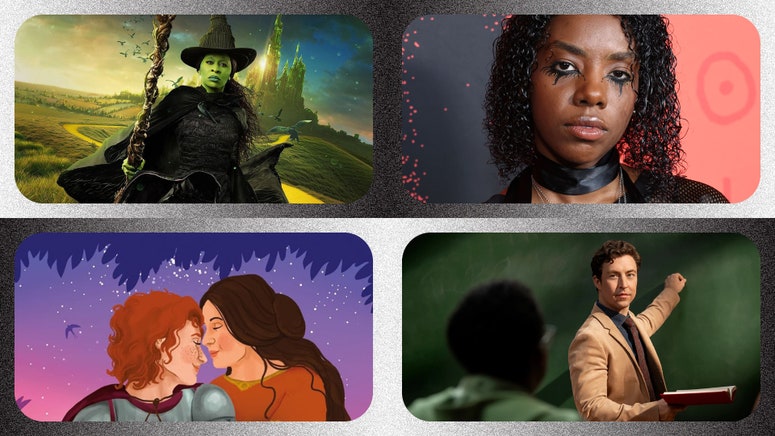In her Instagram bio, Joy Oladokun proudly declares herself to be “ur dad’s favorite new artist.” It’s a playful jab at the “Dad rock”-adjacent music the 32-year-old singer songwriter has become known for. But Oladokun’s rise in the Americana music scene is no joke. Since getting her start in 2015, she has released four critically acclaimed albums, been nominated for a GLAAD Award, and performed at a 2022 White House ceremony for the signing of the Respect for Marriage Act. With all of these acehivements in a tumultuous industry, it’s hard to believe Oladokun wanted to leave it all behind and quit music before writing her latest album, Observations From a Crowded Room, out October 18, but she did.
“Honestly, I still do some days,” she tells me over Zoom. “I have to remind myself, even though it’s a weird job, it’s not unlike most careers where you have up and down seasons or you have moments where you question if this is what you want to do or not.”
Thankfully, Oladokun fought back that nagging notion and instead opened up her creative process, ridding herself of external and self-imposed expectations. “It’s really beautiful to make an album under the premise of: What if everything that I’ve accomplished up until now is enough and I don’t have to sell more records?” she says. The self-produced album, a first for the artist, clearly benefited from that approach, with brutally honest lyrics that hit like a punch to the gut. Songs like “Drugs” speak candidly about the use of weed and other substances to mask pain. The twangy folk-pop track “I’d Miss the Birds” shares unflinching truths about her experience as a Black queer person living in the South. The track captures the complexity of moving almost a decade ago from Casa Grande, Arizona to Nashville, where she sometimes feels unwelcome.
As she prepares for a rigorous tour, which includes both her own headlining shows as well as dates supporting Hozier, Oladokun still grapples with the idea of leaving the music industry. “It’s not because I don’t love and believe in what I do, but to be a marginalized person trying to accomplish anything in a country that doesn’t want to acknowledge how it treats marginalized people, can be exhausting,” she shares. She daydreams about retiring like some of her heroes, joking about “Tracy Chapman, who does whatever Tracy Chapman does, except for when she comes to tell us to vote every four years.”
But if the words she sings in Observations From a Crowded Room reveal one thing, it’s that she still has many truths left to uncover. Ahead of the release of Observations From a Crowded Room, Oladokun spoke with Them about the Venn diagram between straight white men and lesbians, smoking too much weed, and staking her claim in the Nashville scene.
How does being a queer Black woman in Americana– a music scene often dominated by straight white men– affect your day-to-day experience in the industry?
What is Americana music, if not just slowed-down Aretha Franklin songs sung by white men? I prove every day that the Venn diagram between straight white men and most lesbians is a circle. What’s been so interesting about being a marginalized artist is every headlining show that I play, there’s one dude in there that I just feel like he’s here to do violence and not to see my show. But then the show starts and he knows every single word. He’s hanging with the twinks in crop tops, and high-fiving the lesbians.
For me, I see the evidence of the fact that if people let themselves, they can enjoy things made by non-white people. And I think that specifically in the States [there is an] inability to acknowledge that some of y’all’s grandparent’s [racism] is making my day-to-day life so hard. The weight is not so much the experiences, it’s the denial. What a lot of my work is confronting right now is just: you’re not going to pretend that this is not happening anymore. It’s just not feasible.
“I’d Miss The Birds” captures that tension between loving living in Nashville and critiquing it. Can you speak on that?
Honestly, my whole vibe, down to the flannels and Bass Pro Shop limited edition Crocs, is me staking claim. I’m trying to pull a reverse Uno card of all these things: Black cowboys, Black fishermen. My grandma was a tomato farmer. The things that make me feel out of place in Nashville is not the hunting, it’s not the trucks, it’s the “Blue Lives Matter” flags on the back of them. It’s the way that the cops will watch Nazis shout things at Black kids and do nothing. “I Miss The Birds” is about me not pretending that this city is better than it is, no matter how badly it wants to.
On “Drugs,” you express the struggle with reliance on substances. Can you share where you are on that journey today?
I grew up in a small desert town and it was right in between Phoenix and Tucson. We didn’t have a mall until I was in high school. So you just do drugs or you stay inside. I grew up watching the tightrope walk [of] substance use. I smoke pot every day — that’s my sort of vice. But when I was making this record, as I was coming off tour, I was like, “I feel like I’m drinking more than I usually do.” Then, for most of the tour, I was on mushrooms the entire time. It was part of the process of making this record to realize how much I felt like I needed to be outside of my body to do my job.
I’m still finding my way through. I don’t want to do this job if I feel like I have to be out of my mind to do it. A lot of these songs in this album and this period in my life have been so healing-focused. I know some of the things that I’m using aren’t actually healing anything. They’re just sort of masking it so I can keep functioning in society. And I don’t think that’s the goal of medicine.
In that song, you say, “seems like I’ve gotta look for a new way to survive.” Have you found it?
Part of it is just acknowledging my body more. When I’m dysregulated, I do handstands. I think that helps me with little things. When I’m smoking pot, it can be easy to just make the bong a permanent fixture to my face the entire day, but if I am a little more aware of what’s going on in my body and how I feel, I can be like, “Oh, I only need two hits,” and then I can keep moving along my day.
“Am I?” and “Questions, Chaos, Faith” are both about feeling isolated in your worries, and seeing other people live life unbothered while there is so much pain around them. What is the inspiration there?
I’ve always wanted to write in a style that’s conversational. Those two felt like such cornerstones in the sense that it’s, like “Okay, Joy, we get it. You’ve had a hard time being a Z-list rock star, but zoom out just a little bit and recognize that there are other people with other problems.” If I take away the issues that I have with work, there’s still the fact that my neighbors to the east of me are underwater because of the hurricane. I always try to own [the fact that] I hurt, this makes me sad. But I could also probably feel less alone in the hurt and in the sadness if I were to just look up and pay attention.
This record feels really honest. What have you learned about yourself during its creation compared to past albums?
I’ve learned to be more explicit. When you want to be diplomatic or when you want to create a bridge instead of start an argument, it’s really easy to use flowery language or to use seven words to soften the blow when you only need five. I’ve learned that creating change is a little less dancing and a little more boxing in the sense that sometimes you can’t pull a punch to make someone feel better. You just have to get to the heart of the matter.
This conversation has been edited and condensed for clarity.
Observations from a Crowded Room is available October 18 via Amigo Records/Verve Forecast/Republic Records.
Get the best of what’s queer. Sign up for Them’s weekly newsletter here.


